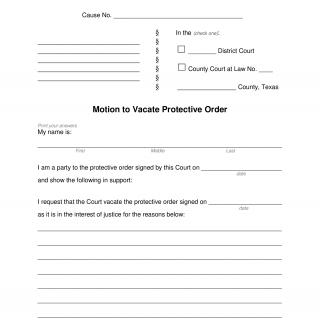Motion to Vacate Protective Order
A "Motion to Vacate Protective Order" refers to a legal request made by a party to a court case, asking the court to lift or cancel a protective order that has been previously issued. A protective order is a legal directive issued by a court to prevent the disclosure of certain information, documents, or evidence to the public or other parties involved in the case. Protective orders are often put in place to safeguard sensitive or confidential information during legal proceedings.
When a party believes that circumstances have changed or that the reasons for the protective order no longer apply, they may file a motion with the court to request the removal or "vacation" of the protective order. This motion is typically submitted in writing and must provide valid reasons and legal arguments for why the protective order should no longer be in effect.
Here are some common reasons why a party might file a Motion to Vacate Protective Order:
-
Change in Circumstances: If the circumstances that initially justified the protective order have changed, such as new evidence or developments in the case, a party might argue that the order is no longer necessary.
-
Discovery Completion: In some cases, protective orders are put in place during the discovery phase of a lawsuit to protect sensitive information. Once the discovery process is complete, a party might request the order be lifted.
-
Public Interest: If the information under the protective order is of significant public interest, a party might argue that transparency and openness in the proceedings are more important than keeping the information confidential.
-
Prejudice or Unfairness: If a party believes that the protective order is unfairly restricting their ability to present their case or defend themselves, they might request its removal.
-
Settlement or Resolution: If the case is settled or resolved, the need for the protective order might be diminished, and a party might seek to have it lifted.
It's important to note that the decision to grant or deny a Motion to Vacate Protective Order is at the discretion of the court. The court will consider the arguments presented by both parties and evaluate whether there is a valid reason to lift the protective order. If the motion is granted, the protected information may become accessible to the public or other parties involved in the case.
Legal proceedings and terminology can vary based on jurisdiction and the specifics of the case, so if you're involved in a legal matter, it's advisable to consult with an attorney who can provide guidance tailored to your situation.

